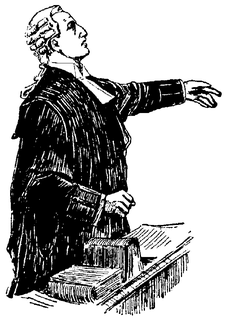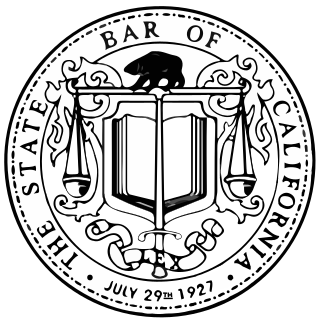
A barrister is a type of lawyer in common law jurisdictions. Barristers mostly specialise in courtroom advocacy and litigation. Their tasks include taking cases in superior courts and tribunals, drafting legal pleadings, researching the philosophy, hypothesis and history of law, and giving expert legal opinions.

A lawyer or attorney is a person who practices law, as an advocate, attorney at law, barrister, barrister-at-law, bar-at-law, canonist, canon lawyer, civil law notary, counsel, counselor, solicitor, legal executive, or public servant preparing, interpreting and applying the law, but not as a paralegal or charter executive secretary. Working as a lawyer involves the practical application of abstract legal theories and knowledge to solve specific individualized problems, or to advance the interests of those who hire lawyers to perform legal services. The role of the lawyer varies greatly across different legal jurisdictions.
In its most general sense, the practice of law involves giving legal advice to clients, drafting legal documents for clients, and representing clients in legal negotiations and court proceedings such as lawsuits, and is applied to the professional services of a lawyer or attorney at law, barrister, solicitor, or civil law notary. However, there is a substantial amount of overlap between the practice of law and various other professions where clients are represented by agents. These professions include real estate, banking, accounting, and insurance. Moreover, a growing number of legal document assistants (LDAs) are offering services which have traditionally been offered only by lawyers and their employee paralegals. Many documents may now be created by computer-assisted drafting libraries, where the clients are asked a series of questions that are posed by the software in order to construct the legal documents. In addition, regulatory consulting firms also provide advisory services on regulatory compliance that were traditionally provided exclusively by law firms.
A solicitor is a legal practitioner who traditionally deals with most of the legal matters in some jurisdictions. A person must have legally-defined qualifications, which vary from one jurisdiction to another, to be described as a solicitor and enabled to practise there as such. For example, in England and Wales a solicitor is admitted to practise under the provisions of the Solicitors Act 1974. With some exceptions, practising solicitors must possess a practising certificate. There are many more solicitors than barristers in England; they undertake the general aspects of giving legal advice and conducting legal proceedings.
An attorney at law in the United States is a practitioner in a court of law who is legally qualified to prosecute and defend actions in court on the retainer of clients. Alternative terms include counselor and lawyer. As of April 2011, there were 1,225,452 licensed attorneys in the United States. A 2012 survey conducted by LexisNexis Martindale-Hubbell determined 58 million consumers in the U.S. sought an attorney in the last year and that 76 percent of consumers used the Internet to search for an attorney.

Admission to the bar in the United States is the granting of permission by a particular court system to a lawyer to practice law in the jurisdiction and before those courts. Each U.S. state and similar jurisdiction has its own court system and sets its own rules for bar admission, which can lead to different admission standards among states. In most cases, a person is "admitted" or "called" to the bar of the highest court in the jurisdiction and is thereby authorized to practice law in the jurisdiction. Federal courts, although often overlapping in admission standards with states, set their own requirements for practice in each of those courts.
A paralegal is a professional who performs tasks that require knowledge of legal concepts but not the full expertise of a lawyer. The market for paralegals is broad, including consultancies, companies that have legal departments or that perform legislation compliance activities in areas such as environment, labor, intellectual property and tax. Legal offices and public bodies also have many paralegals in support activities although they do not yet use the correct name of the profession.
A conflict of interest (COI) is a situation in which a person or organization is involved in multiple interests, financial or otherwise, and serving one interest could involve working against another. Typically, this relates to situations in which the personal interest of an individual or organization might adversely affect a duty owed to make decisions for the benefit of a third party.

The American Bar Association (ABA) is a voluntary bar association of lawyers and law students, which is not specific to any jurisdiction in the United States. Founded in 1878, the ABA's most important stated activities are the setting of academic standards for law schools, and the formulation of model ethical codes related to the legal profession. As of fiscal year 2017, the ABA had 194,000 dues-paying members, constituting approximately 14.4% of American attorneys. In 1979, half of all lawyers in the U.S. were members of the ABA. The organization's national headquarters are in Chicago, Illinois, and it also maintains a significant branch office in Washington, D.C.
A bar examination is an examination administered by the bar association of a jurisdiction that a lawyer must pass in order to be admitted to the bar of that jurisdiction.

The State Bar of California is California's official attorney licensing agency. It is responsible for managing the admission of lawyers to the practice of law, investigating complaints of professional misconduct, prescribing appropriate discipline, accepting attorney-member fees, and financially distributing sums paid through attorney trust accounts to fund nonprofit legal entities. It is directly responsible to the Supreme Court of California, however, its Trustees are now appointed by the Supreme Court, the California Legislature, and Governor of California. All attorney admissions are issued as recommendations of the State Bar, which are then routinely ratified by the Supreme Court. Attorney discipline is handled by the State Bar Office of Chief Trial Counsel, which acts as prosecutor before the State Bar Court of California.
Attorney's fee is a chiefly United States term for compensation for legal services performed by an attorney for a client, in or out of court. It may be an hourly, flat-rate or contingent fee. Recent studies suggest that when lawyers charge a flat-fee rather than billing by the hour, they work less hard on behalf of clients and clients get worse outcomes. Attorney fees are separate from fines, compensatory and punitive damages, and from court costs in a legal case. Under the "American rule", attorney fees are usually not paid by the losing party to the winning party in a case, except pursuant to specific statutory or contractual rights.
Legal outsourcing, also known as legal process outsourcing (LPO), refers to the practice of a law firm or corporation obtaining legal support services from an outside law firm or legal support services company. When the LPO provider is based in another country, the practice is called offshoring and involves the practice of outsourcing any activity except those where personal presence or contact is required, e.g. appearances in court and face-to-face negotiations. When the LPO provider is based in the same country, the practice of outsourcing includes agency work and other services requiring a physical presence, such as court appearances. This process is one of the incidents of the larger movement towards outsourcing. The most commonly offered services have been agency work, document review, legal research and writing, drafting of pleadings and briefs, and patent services.
An admission to practice law is acquired when a lawyer receives a license to practice law. In jurisdictions with two types of lawyer, as with barristers and solicitors, barristers must gain admission to the bar whereas for solicitors there are distinct practising certificates.
A personal injury lawyer is a lawyer who provides legal services to those who claim to have been injured, physically or psychologically, as a result of the negligence of another person, company, government agency or any entity. Personal injury lawyers primarily practice in the area of law known as tort law. Examples of common personal injury claims include injuries from slip and fall accidents, traffic collisions, defective products, workplace injuries and professional malpractice.
The Washington State Bar Association (WSBA) operates under the delegated authority of the Washington Supreme Court to license the state's nearly 41,000 active and inactive lawyers and other legal professionals. In furtherance of its obligation to protect and serve the public, the WSBA both regulates lawyers and other legal professionals and serves its members as a professional association — all without public funding. The WSBA's mission is to serve the public and the members of the Bar, to ensure the integrity of the legal profession, and to champion justice.

Avvo.com is an online marketplace for legal services, that provides lawyer referrals and access to a database of legal information consisting primarily of previously answered questions. Lawyer profiles may include client reviews, disciplinary actions, peer endorsements, and lawyer-submitted legal guides.
In the United States, advertising of services by members of the profession of law is typically permitted but regulated by state court and bar association rules.
The National Board of Trial Advocacy (NBTA) is a non-profit board certification organization in the United States which administers eight national board certification programs for attorneys in Civil Trial Law, Criminal Trial Law, Truck Accident Law, Family Trial Law, Civil Practice Advocacy, Social Security Disability Law, Complex Litigation, and Patent Litigation. To become board-certified, an attorney must meet substantial professional requirements and undergo a peer review process. There are currently close to 2,000 attorneys who are certified by the NBTA. The organization is led by board of directors of noted trial lawyers, law professors, and judges.
The Alaska Bar Association is a mandatory bar association responsible for the Alaska Supreme Court and for the admission and discipline process of attorneys for the state of Alaska.





